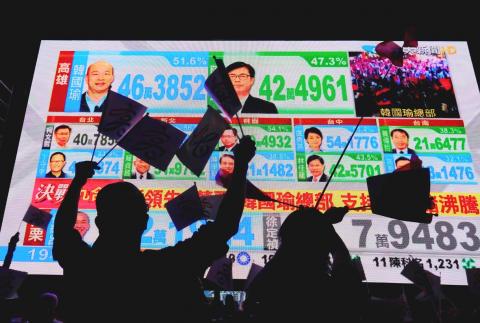Six US senators have asked US government agencies to help Taiwan investigate China’s alleged meddling in its elections and take action to prevent Beijing from interfering in elections in democracies worldwide.
“We appreciate your actions your departments are already taking to address CCP [Chinese Communist Party] foreign interference,” the senators said in a letter addressed to US Secretary of State Mike Pompeo, US Secretary of the Treasury Steven Mnuchin, US Director of National Intelligence Dan Coats and FBI Director Christopher Wray.
“We encourage you to work closely with Taiwan authorities to thoroughly investigate these allegations and, if necessary, take swift action to deter future CCP interference in elections in Taiwan or elsewhere across the globe,” senators Catherine Cortez Masto, Marco Rubio, Christopher Coons, Cory Gardner, Michael Bennet and Ted Cruz said in the letter dated on Thursday last week.

Photo: CNA
Taipei has suggested that illegal campaign contributions to pro-Beijing political candidates were one of the primary tools of alleged CCP interference in the Nov. 24 nine-in-one elections, the letter said.
The Taiwanese government has also accused the CCP of “using disinformation to shape public opinion of political candidates deemed unsympathetic to Beijing’s interests” and has said that “the CCP spread false information through social media and messaging platforms,” it added.
The CCP’s attempts to erode democratic processes and norms around the world threaten US partnerships and prosperity, and if Taipei’s allegations are proved true, it “would be deeply concerning not only for Taiwan’s future, but also for fellow democracies ... where the CCP choose to interfere,” the senators said.
“We believe such allegations must be taken seriously if free societies are to continue to thrive,” they added.
Citing comments by US Deputy Assistant Secretary of State Scott Busby that praised Taiwan as “an invaluable model to others,” the senators said that democracies such as the US and Taiwan need to stand together.
It was especially important at a time of democratic backsliding and human rights abuses elsewhere in the Indo-Pacific region that the two sides join hands to promote “a brighter future, free of repression, censorship and exploitation,” they said.
WELCOME SUPPORT
“We write to express our support for efforts to counter interference of this nature and to state unequivocally that we stand shoulder to shoulder with democracies fighting attempts to undermine their sovereignty and freedom,” the senators added.
On the sidelines of a meeting of the Legislative Yuan’s Foreign and National Defense Committee yesterday, Minister of Foreign Affairs Joseph Wu (吳釗燮) thanked the US Congress for its support and said that Taiwan has had many discussions with US authorities on the matter.
Taiwan hopes to join in discussions with other nations to help prevent similar interference in democratic practices in other free nations, he said.

The US government has signed defense cooperation agreements with Japan and the Philippines to boost the deterrence capabilities of countries in the first island chain, a report by the National Security Bureau (NSB) showed. The main countries on the first island chain include the two nations and Taiwan. The bureau is to present the report at a meeting of the legislature’s Foreign Affairs and National Defense Committee tomorrow. The US military has deployed Typhon missile systems to Japan’s Yamaguchi Prefecture and Zambales province in the Philippines during their joint military exercises. It has also installed NMESIS anti-ship systems in Japan’s Okinawa

TRAGEDY STRIKES TAIPEI: The suspect died after falling off a building after he threw smoke grenades into Taipei Main Station and went on a killing spree in Zhongshan A 27-year-old suspect allegedly threw smoke grenades in Taipei Main Station and then proceeded to Zhongshan MRT Station in a random killing spree that resulted in the death of the suspect and two other civilians, and seven injured, including one in critical condition, as of press time last night. The suspect, identified as a man surnamed Chang Wen (張文), allegedly began the attack at Taipei Main Station, the Taipei Fire Department said, adding that it received a report at 5:24pm that smoke grenades had been thrown in the station. One man in his 50s was rushed to hospital after a cardiac arrest

‘WIN-WIN’: The Philippines, and central and eastern European countries are important potential drone cooperation partners, Minister of Foreign Affairs Lin Chia-lung said Minister of Foreign Affairs Lin Chia-lung (林佳龍) in an interview published yesterday confirmed that there are joint ventures between Taiwan and Poland in the drone industry. Lin made the remark in an exclusive interview with the Chinese-language Liberty Times (the Taipei Times’ sister paper). The government-backed Taiwan Excellence Drone International Business Opportunities Alliance and the Polish Chamber of Unmanned Systems on Wednesday last week signed a memorandum of understanding in Poland to develop a “non-China” supply chain for drones and work together on key technologies. Asked if Taiwan prioritized Poland among central and eastern European countries in drone collaboration, Lin

ON ALERT: Taiwan’s partners would issue warnings if China attempted to use Interpol to target Taiwanese, and the global body has mechanisms to prevent it, an official said China has stationed two to four people specializing in Taiwan affairs at its embassies in several democratic countries to monitor and harass Taiwanese, actions that the host nations would not tolerate, National Security Bureau (NSB) Director-General Tsai Ming-yen (蔡明彥) said yesterday. Tsai made the comments at a meeting of the legislature’s Foreign Affairs and National Defense Committee, which asked him and Minister of National Defense Wellington Koo (顧立雄) to report on potential conflicts in the Taiwan Strait and military preparedness. Democratic Progressive Party (DPP) Legislator Michelle Lin (林楚茵) expressed concern that Beijing has posted personnel from China’s Taiwan Affairs Office to its